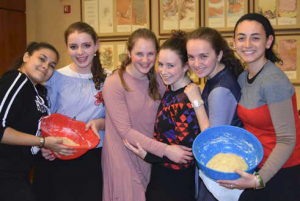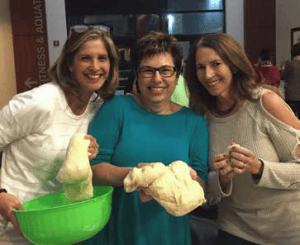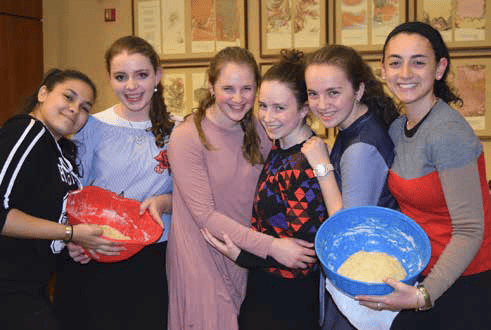
In a delightfully busy night filled with flour and community, 150 women gathered to mix, knead, and braid at Tidewater’s 3rd Annual Great Big Challah Bake.
Held on Thursday, Oct. 26 at the Reba and Sam Sandler Family Campus, the women-only event offered the opportunity to learn and experience the mitzvah of making challah and share in the joy of the ritual.
From varied backgrounds, the attendees were school-aged to seniors, religiously observant and secular, affiliated and unaffiliated, experienced challah makers and newcomers—friends, sisters, mothers, daughters, and grandmothers.
“I have made challah hundreds of times over the years in my own kitchen,” says Lisa Rosenbach, “but being in a room with 150 other women all making challah together as a community to enjoy on Shabbat was an incredibly moving experience.”
The suggested donation for Challah Bake was $5 per person, which helped cover the cost of the kosher ingredients. Participants went home with at least two challahs, their plastic kneading bowl, instructions for baking their bread for Shabbat, the recipe to continue baking challah in the future, and memories of a truly unique and fun experience.
At “intermission” guests heard personal stories about the meaning of Shabbat, as well as beautiful violin music played by Leah Greenwald during which time the dough rose. The women then returned to knead their dough so they could manipulate it. They pinched, rolled, and braided the dough into beautiful braids of all skill levels.
The evening ended with approximately 200 pounds of flour, 50 pounds of sugar, 200 eggs, gallons of oil and water used to make more than 200 challahs to bake for Shabbat.
Chaired by Darcy Bloch and Mindy Rubenstein, the Jewish Life and Learning department of the Simon Family JCC provided funding and organizational support for the event.
The Great Big Challah Bake is held in hundreds of communities and cities around the world each year; tens of thousands of women participate. It’s a lead up to an even larger global observation, held this year, October 27 – 28, sponsored and promoted by The Shabbos Project, a South African-based non-profit. Locally, B’nai Israel Congregation hosted events for the observation, also known as the Shabbat Project.
“Knowing that women all over the world were also getting together as one community made it even more special,” Rosenbach says.

